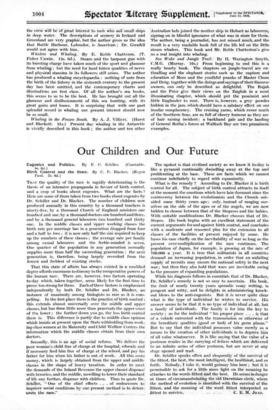Our Children and Our Future
THAT the quality of the race is rapidly deteriorating is the thesis of an intensive propaganda in favour of birth control, and a crop of books about eugenics. What are the facts ? Here are some of them taken from two books about eugenics by Dr. Schiller and Dr. Blacker. The number of children now produced annually in this country by a thousand teachers is ninety-five, by a thousand Church of England ministers one htmdred and one, by a thousand doctors one hundred and three, and by a thousand general labourers two hundred and thirty one. In the middle classes and upper Working classes the birth rate per marriage has in a generation dropped from four and a half to two ; it is now only half the size required to keep up the numbers of these classes ; the average rate per family among casual labourers and the feeble-minded is seven. One quarter of the population- in any generation normally supplies more than half the succeeding generation ; the next generation is, therefore, being largely recruited from the lowest and feeblest of existing stocks.
That this state of affairs has always existed in a modified degree affords enormous testimony to the recuperative powers of the human race. There are, however, two factors operating
to-day which, taken together, seem likely for the first time to prove too strong for them. Each of these factors is emphasized
independently by both Dr. Schiller and - Dr. Blacker, an instance of unanimity among biologists as rare as it is com- pelling. lathe first place there is the practice of birth control ; this extends almost universally over the middle and upper classes, but has done little more than penetrate the upper crust of the lower ; the further, down you go, the less birth control there is. This difference is partly due to middle class opinion which insists at present upon the State withholding from work-, lug-class women at its Maternity and Child Welfare Centres the
information which the middle classes obtain from their own doctors. _ .
Secondly, this is an age of soeial reform. 'We deliver the poor woman's child free of charge at the hospital, educate and
if necessary feed him free of charge at the school, and pay his father for him when his father is out of work; All this costs money, which is largely obtained from the upper and middle
classes in the shape of heavy taxation. In order to meet the demands of the Inland Revenue the upper clasSeg dispense' with luxuries, and the middle, unwilling to lower their standard of life any further, dispense with children. Thus to quote Dr.
"One of the chief effects ... . of endeavours to improve social conditions by our present method-is to deteri- orate the race."
The upshot is that civilized society as we know it to-day is like a pyramid continually dwindli g away at the top and proliferating at the base. These are facts which we cannot continue indefinitely to regard with equanimity.
What is the remedy ? According to Dr. Blacker it is birth control for all. The subject of birth control attracts to itself at the moment the emotions which have lain dormant since the controversy between the evolutionists and the Church sub- sided some thirty years ago ; only, instead of ranging our- selves on the side of the apes or of the angels, we are now bidden to choose between that of the Stopeses and the babies. With suitable modifications Dr. Blacker chooses that of Dr. Stapes: His book begins with an excellent statement of the current arguments for and against birth control, and concludes with a • moderate and reasoned plea for the extension to all classes of the facilities at present enjoyed by some. He bases his case chiefly on the inevitability of war so long as the present over-multiplication of the race continues. The population of Japan, for example, is growing at the rate of 700,000 a year. It is true that militarists in all countries demand an increasing population, in order that an unfailing supply of recruits may ensure the national safety in the next war ; but then they also hold that wars are inevitable owing to the pressure of expanding populations.
While hiS diagnosis follaws in essentials that of Dr. Blacker, Dr. Schiller's remedy is not so easy to ascertain. His book, the fruit of nearly twenty years sporadic essay writing, is pungent and witty, and he delights in administering knock- out blows to the anti-eugenists. But it is never quite clear what is the type of individual he wishes to survive. His answer seems to be that it is no type of individual at all, but a family of individuals. The family is for him the key to society ; as for the -individual "his proper place . . . is that of a vehicle entrusted with the transmission or otherwise of the hereditary qualities (good or bad) of his germ plasm." But to say that the individual possesses value merely as a means to the creation of other individuals is to deprive hit' n of all value whatsoever. It is like saying that the value of a postman resides in the carrying of letters which are delivered to an infinite series of other postmen, but are never at any stage opened and read. ,.
Dr. Schiller speaks often and eloquently of the survival of the fittest, the best, the most intelligent, the healthiest, and so forth. Nobody, I take it, would gainsay him here ; but it is permissible to ask for a little more light on the meaning he attaches to the words fittest and the best. He seems in danger at times of circumainbulating, the -old Darwinian circle, where the method of evolution is identified with the survival of the fittest, and the meaning of the word fittest interpreted as






















































 Previous page
Previous page